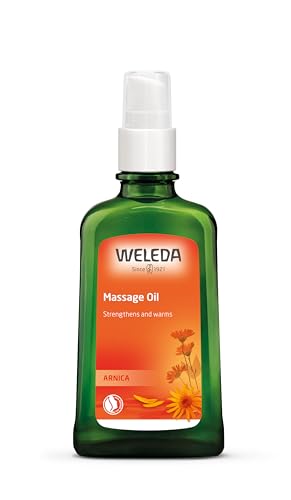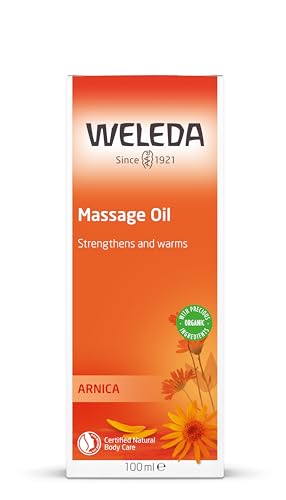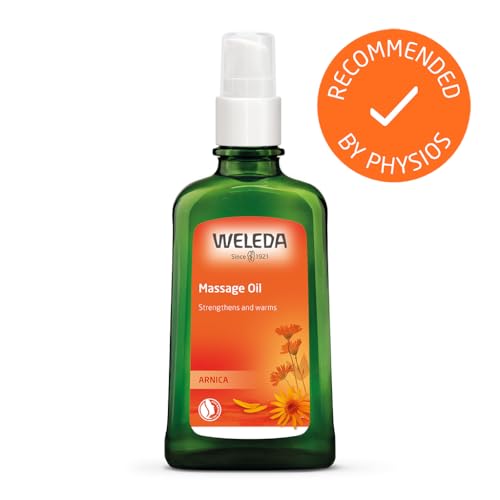



Weleda Arnica Muscle Massage Oil - Soothes Sore Muscles, Plant-Based Oils - 3.4 Fl Oz


Coumarin
High RiskCoumarin is a naturally occurring and synthetic compound found in many plants. It is commonly used in fragrances, flavorings, and as a potential therapeutic agent due to its aromatic properties. Coumarin has applications in cosmetics and personal care products, contributing to their scent and stability.
Sustai Insights
Coumarin offers functional benefits as a fragrance and flavoring agent, with potential health benefits in certain therapeutic contexts. However, it is associated with high allergenic potential and may pose risks such as skin irritation. Environmental concerns include its classification as a pollutant, with possible bioaccumulation effects. Regulatory bodies have restricted its use in specific products, indicating a moderate to high risk overall. Safe usage practices are advised, and alternatives like natural essential oils could be considered.
Geraniol
High RiskGeraniol is a naturally occurring scent ingredient commonly found in essential oils from plants such as geraniums and lemongrass. It is primarily used for its pleasant floral aroma in perfumes, cosmetics, and household products.
Sustai Insights
Geraniol serves as a fragrance component and offers a natural option for scenting products. However, it has a high allergenic potential and may cause skin irritation in sensitive individuals. While it is considered low risk for carcinogenicity and reproductive toxicity, regulatory bodies have placed restrictions on its use due to allergenic concerns. Overall, the assessment reflects a high-risk level, particularly for those prone to allergies, highlighting the need for caution in its application.
Linalool
High RiskLinalool is a terpene commonly found in various plants, particularly in lavender and mint. It is primarily used in products for its fragrance and potential antimicrobial properties. Linalool is also utilized in formulations for its ability to enhance the sensory experience of personal care and household products.
Sustai Insights
Linalool offers functional benefits as a naturally occurring fragrance component and may exhibit antimicrobial properties. However, it presents high allergenic potential, with concerns about skin irritation and sensitization. Environmental risks include contamination issues, though it is not classified as a persistent pollutant. Regulatory bodies have noted the need for careful handling due to its allergenic nature. Overall, despite some beneficial attributes, the ingredient carries a high risk profile, warranting cautious use and consideration of safer alternatives.
Fragrance
High RiskFragrance refers to a mixture of aromatic compounds used in products to provide scent. It is commonly listed as 'fragrance' or 'parfum' on product labels and can serve various functions, including enhancing user experience and masking undesirable odors.
Sustai Insights
Fragrance offers functional benefits by improving product appeal; however, it poses significant health risks, notably a high likelihood of causing allergies and allergic contact dermatitis. Environmental risks include potential pollution and endocrine disruption, though its overall carcinogenicity is low. Regulatory bodies have noted concerns regarding its use, leading to a high-risk classification. Safe usage practices should be observed, and alternatives such as natural essential oils are recommended for those sensitive to synthetic fragrances.
Arnica Montana (Arnica) Flower Extract
Medium RiskArnica montana flower extract is derived from the dried flowers of the arnica plant, commonly used in topical formulations for its anti-inflammatory and analgesic properties. It is often included in products aimed at alleviating pain and bruising.
Sustai Insights
Arnica montana flower extract offers functional benefits as a natural anti-inflammatory and pain relief agent, with sustainable sourcing possibilities. However, it poses moderate allergenic risks and can cause skin irritation in sensitive individuals. Regulatory bodies, including the FDA, do not currently restrict its use, indicating a low overall risk for carcinogenicity and reproductive toxicity. Safe usage practices should be followed to minimize adverse effects, and alternatives such as calendula extract may be considered for similar benefits. Overall, the risk level associated with arnica montana extract is assessed as medium.
Limonene
Medium RiskLimonene is a scent ingredient and solvent naturally found in citrus fruits, commonly used in personal care and cleaning products for its fragrant properties. It serves as a flavoring agent and enhances the overall sensory experience of products.
Sustai Insights
Limonene offers functional benefits such as acting as a solvent and fragrance enhancer. However, it carries a high allergenic potential, which can trigger skin or respiratory sensitivities in some individuals. Environmental concerns include moderate persistence and bioaccumulation, along with potential ecotoxicity. Regulatory restrictions necessitate verification in products containing this ingredient. Overall, the risk level is assessed as medium, emphasizing the importance of cautious use, particularly for sensitive populations. Safer alternatives may be considered to mitigate these risks.
Betula Alba (Birch) Leaf Extract
Low RiskBetula alba (birch) leaf extract is derived from the leaves of the birch tree and is commonly used in cosmetic formulations for its potential soothing and anti-inflammatory properties.
Sustai Insights
Betula alba leaf extract offers functional benefits such as potential skin soothing and anti-inflammatory effects. It is considered to have low health risk, with no significant concerns regarding carcinogenicity, allergies, or reproductive toxicity. Environmentally, it is not known to be a pollutant or bioaccumulative. Regulatory assessments indicate no current restrictions. Overall, the ingredient is assessed as low risk, making it a suitable choice for cosmetic applications. Users should follow safe usage practices, and alternatives may include other botanical extracts with similar properties.
Olea Europaea (Olive) Oil
Low RiskOlea europaea (olive) oil is derived from the ripe fruit of the olive tree. It is commonly used in cosmetic formulations primarily as a moisturizer and emollient due to its nourishing properties for the skin. It also serves as a carrier oil for other ingredients in formulations.
Sustai Insights
Olea europaea (olive) oil offers numerous functional benefits, including effective moisturization and enhanced skin absorption properties, making it suitable for various cosmetic applications. It is a biodegradable ingredient, contributing to sustainability when sourced responsibly. Health risks are low, with minimal concerns regarding carcinogenicity, allergenic potential, and developmental toxicity. Environmental risks are also low, with no significant bioaccumulation or pollution potential noted. Regulatory bodies do not impose restrictions on its use. Overall, olive oil presents a low risk profile, making it a favorable choice in cosmetic products.
Helianthus Annuus (Sunflower) Seed Oil
Low RiskHelianthus annuus (sunflower) seed oil is derived from the seeds of the sunflower plant. It serves primarily as an emollient and moisturizer in cosmetic formulations, helping to maintain skin hydration and improve texture.
Sustai Insights
Sunflower seed oil is effective as an emollient, providing moisture and improving skin texture while being biodegradable and sustainably sourced. It poses low health risks, including negligible concerns for carcinogenicity, allergies, or reproductive toxicity. Environmentally, it does not significantly contribute to pollution or bioaccumulation. Regulatory bodies currently do not list any advisories for this ingredient. Overall, it is assessed as low risk, with safe usage practices recommended. Alternatives include oils like jojoba or almond oil for those seeking different properties.
Betula Alba (Birch) Leaf Extract
Low RiskBetula alba (birch) leaf extract is derived from the leaves of the birch tree and is commonly used in cosmetic formulations for its potential soothing and anti-inflammatory properties.
Sustai Insights
Betula alba leaf extract offers functional benefits such as potential skin soothing and anti-inflammatory effects. It is considered to have low health risk, with no significant concerns regarding carcinogenicity, allergies, or reproductive toxicity. Environmentally, it is not known to be a pollutant or bioaccumulative. Regulatory assessments indicate no current restrictions. Overall, the ingredient is assessed as low risk, making it a suitable choice for cosmetic applications. Users should follow safe usage practices, and alternatives may include other botanical extracts with similar properties.
Olea Europaea (Olive) Oil
Low RiskOlea europaea (olive) oil is derived from the ripe fruit of the olive tree. It is commonly used in cosmetic formulations primarily as a moisturizer and emollient due to its nourishing properties for the skin. It also serves as a carrier oil for other ingredients in formulations.
Sustai Insights
Olea europaea (olive) oil offers numerous functional benefits, including effective moisturization and enhanced skin absorption properties, making it suitable for various cosmetic applications. It is a biodegradable ingredient, contributing to sustainability when sourced responsibly. Health risks are low, with minimal concerns regarding carcinogenicity, allergenic potential, and developmental toxicity. Environmental risks are also low, with no significant bioaccumulation or pollution potential noted. Regulatory bodies do not impose restrictions on its use. Overall, olive oil presents a low risk profile, making it a favorable choice in cosmetic products.
Coumarin
High RiskCoumarin is a naturally occurring and synthetic compound found in many plants. It is commonly used in fragrances, flavorings, and as a potential therapeutic agent due to its aromatic properties. Coumarin has applications in cosmetics and personal care products, contributing to their scent and stability.
Sustai Insights
Coumarin offers functional benefits as a fragrance and flavoring agent, with potential health benefits in certain therapeutic contexts. However, it is associated with high allergenic potential and may pose risks such as skin irritation. Environmental concerns include its classification as a pollutant, with possible bioaccumulation effects. Regulatory bodies have restricted its use in specific products, indicating a moderate to high risk overall. Safe usage practices are advised, and alternatives like natural essential oils could be considered.
Arnica Montana (Arnica) Flower Extract
Medium RiskArnica montana flower extract is derived from the dried flowers of the arnica plant, commonly used in topical formulations for its anti-inflammatory and analgesic properties. It is often included in products aimed at alleviating pain and bruising.
Sustai Insights
Arnica montana flower extract offers functional benefits as a natural anti-inflammatory and pain relief agent, with sustainable sourcing possibilities. However, it poses moderate allergenic risks and can cause skin irritation in sensitive individuals. Regulatory bodies, including the FDA, do not currently restrict its use, indicating a low overall risk for carcinogenicity and reproductive toxicity. Safe usage practices should be followed to minimize adverse effects, and alternatives such as calendula extract may be considered for similar benefits. Overall, the risk level associated with arnica montana extract is assessed as medium.
Geraniol
High RiskGeraniol is a naturally occurring scent ingredient commonly found in essential oils from plants such as geraniums and lemongrass. It is primarily used for its pleasant floral aroma in perfumes, cosmetics, and household products.
Sustai Insights
Geraniol serves as a fragrance component and offers a natural option for scenting products. However, it has a high allergenic potential and may cause skin irritation in sensitive individuals. While it is considered low risk for carcinogenicity and reproductive toxicity, regulatory bodies have placed restrictions on its use due to allergenic concerns. Overall, the assessment reflects a high-risk level, particularly for those prone to allergies, highlighting the need for caution in its application.
Limonene
Medium RiskLimonene is a scent ingredient and solvent naturally found in citrus fruits, commonly used in personal care and cleaning products for its fragrant properties. It serves as a flavoring agent and enhances the overall sensory experience of products.
Sustai Insights
Limonene offers functional benefits such as acting as a solvent and fragrance enhancer. However, it carries a high allergenic potential, which can trigger skin or respiratory sensitivities in some individuals. Environmental concerns include moderate persistence and bioaccumulation, along with potential ecotoxicity. Regulatory restrictions necessitate verification in products containing this ingredient. Overall, the risk level is assessed as medium, emphasizing the importance of cautious use, particularly for sensitive populations. Safer alternatives may be considered to mitigate these risks.
Linalool
High RiskLinalool is a terpene commonly found in various plants, particularly in lavender and mint. It is primarily used in products for its fragrance and potential antimicrobial properties. Linalool is also utilized in formulations for its ability to enhance the sensory experience of personal care and household products.
Sustai Insights
Linalool offers functional benefits as a naturally occurring fragrance component and may exhibit antimicrobial properties. However, it presents high allergenic potential, with concerns about skin irritation and sensitization. Environmental risks include contamination issues, though it is not classified as a persistent pollutant. Regulatory bodies have noted the need for careful handling due to its allergenic nature. Overall, despite some beneficial attributes, the ingredient carries a high risk profile, warranting cautious use and consideration of safer alternatives.
Fragrance
High RiskFragrance refers to a mixture of aromatic compounds used in products to provide scent. It is commonly listed as 'fragrance' or 'parfum' on product labels and can serve various functions, including enhancing user experience and masking undesirable odors.
Sustai Insights
Fragrance offers functional benefits by improving product appeal; however, it poses significant health risks, notably a high likelihood of causing allergies and allergic contact dermatitis. Environmental risks include potential pollution and endocrine disruption, though its overall carcinogenicity is low. Regulatory bodies have noted concerns regarding its use, leading to a high-risk classification. Safe usage practices should be observed, and alternatives such as natural essential oils are recommended for those sensitive to synthetic fragrances.
Helianthus Annuus (Sunflower) Seed Oil
Low RiskHelianthus annuus (sunflower) seed oil is derived from the seeds of the sunflower plant. It serves primarily as an emollient and moisturizer in cosmetic formulations, helping to maintain skin hydration and improve texture.
Sustai Insights
Sunflower seed oil is effective as an emollient, providing moisture and improving skin texture while being biodegradable and sustainably sourced. It poses low health risks, including negligible concerns for carcinogenicity, allergies, or reproductive toxicity. Environmentally, it does not significantly contribute to pollution or bioaccumulation. Regulatory bodies currently do not list any advisories for this ingredient. Overall, it is assessed as low risk, with safe usage practices recommended. Alternatives include oils like jojoba or almond oil for those seeking different properties.
Experience the soothing power of Weleda Arnica Muscle Massage Oil, designed for those who appreciate natural wellness. This plant-rich massage oil combines the calming properties of arnica with nourishing sunflower and olive oils, perfect for revitalizing sore muscles and enhancing skin elasticity.
- Soothing Relief: The arnica oil, combined with active carrier oils, helps alleviate muscle soreness and promotes relaxation.
- Nourishing Formula: Enriched with sunflower and olive oils, this massage oil moisturizes and rejuvenates the skin, leaving it firm and visibly renewed.
- Natural Ingredients: Made without synthetic compounds or toxic chemicals, the oil features carefully selected flower, fruit, and root extracts for a gentle touch.
- Easy Application: Simply warm the oil in your hands and massage into areas of tension for immediate comfort and relief.
- Mindful Wellness: Breathe in the natural aromas while you unwind, making this oil an ideal addition to your self-care routine.
Trust in Weleda's commitment to sustainability and ethical practices, ensuring a product that is good for both your body and the planet.
Subscribe & Save with Sustai
- Best Price Guarantee: Always enjoy the lowest prices on sustainable home essentials.
- No Surprises: We’ll notify you before shipping. No hidden fees, ever.
- You’re in Charge: Change, pause, or cancel your subscription anytime with ease.
- Eco-Friendly Deliveries: Our grouped shipments mean less packaging and lower emissions.
Join us on a sustainable journey. Special offers for a limited time! Prices and promotions may change.
Recommended Products
Experience the soothing power of Weleda Arnica Muscle Massage Oil, designed for those who appreciate natural wellness. This plant-rich massage oil combines the calming properties of arnica with nourishing sunflower and olive oils, perfect for revitalizing sore muscles and enhancing skin elasticity.
- Soothing Relief: The arnica oil, combined with active carrier oils, helps alleviate muscle soreness and promotes relaxation.
- Nourishing Formula: Enriched with sunflower and olive oils, this massage oil moisturizes and rejuvenates the skin, leaving it firm and visibly renewed.
- Natural Ingredients: Made without synthetic compounds or toxic chemicals, the oil features carefully selected flower, fruit, and root extracts for a gentle touch.
- Easy Application: Simply warm the oil in your hands and massage into areas of tension for immediate comfort and relief.
- Mindful Wellness: Breathe in the natural aromas while you unwind, making this oil an ideal addition to your self-care routine.
Trust in Weleda's commitment to sustainability and ethical practices, ensuring a product that is good for both your body and the planet.

You can have at most 2 Sustainable Steals products in your cart
Customer Reviews
Customers’ View
Customers appreciate the effectiveness and natural composition of Weleda Arnica Muscle Massage Oil. Many users highlight its soothing properties, noting that it provides relief for minor aches and joint pain, making it a go-to solution for post-activity recovery. For instance, one customer mentioned it helped immensely with leg pain after long periods of sitting. The product's blend of arnica and carrier oils is praised for its calming effect, with users enjoying the pleasant scent and nourishing feel on the skin. Additionally, customers value the absence of synthetic ingredients, aligning with their preferences for eco-friendly and safe products. Overall, the oil is seen as a reliable choice that complements a health-conscious lifestyle.
AI-generated from the text of customer reviewsThis product is rated 4.9 of 5.0 stars.
It has received 16 reviews.




